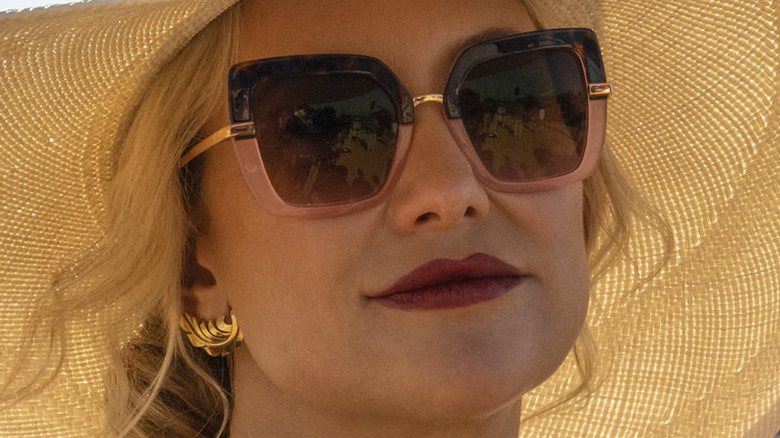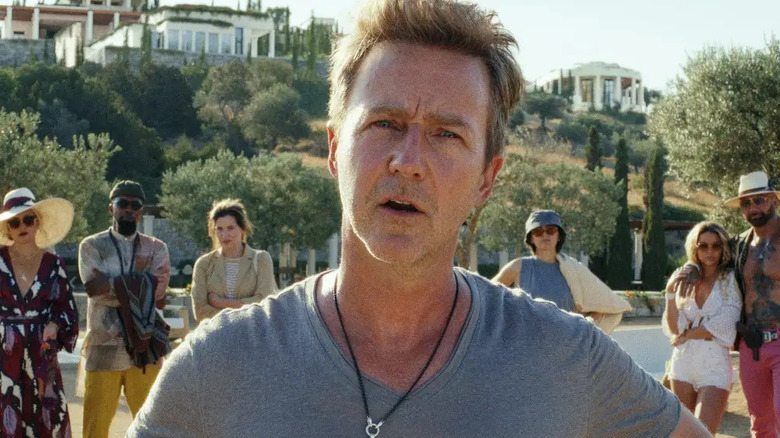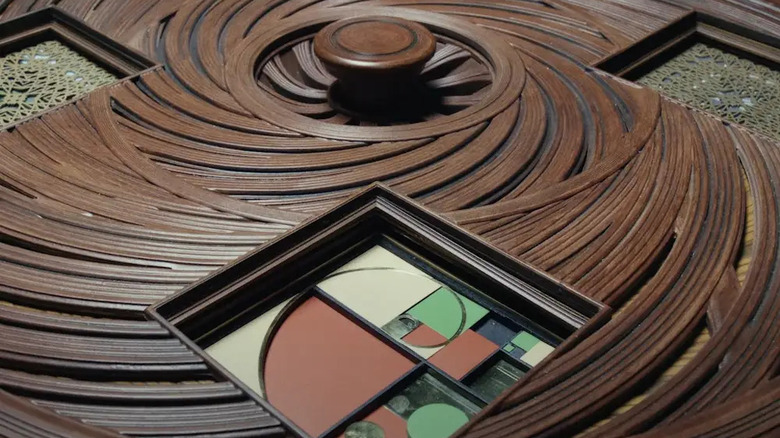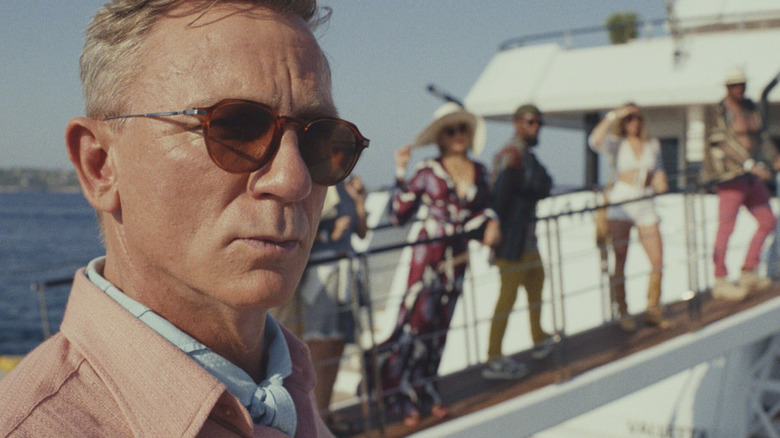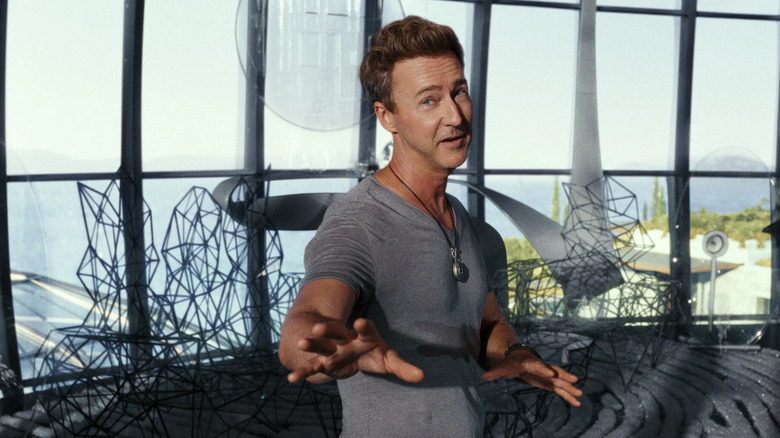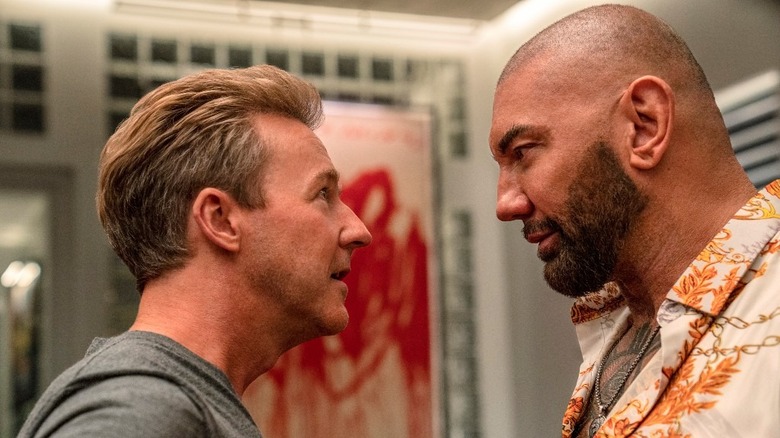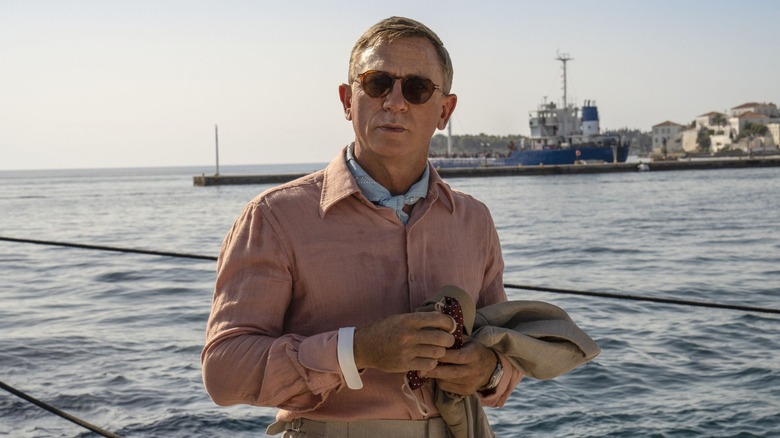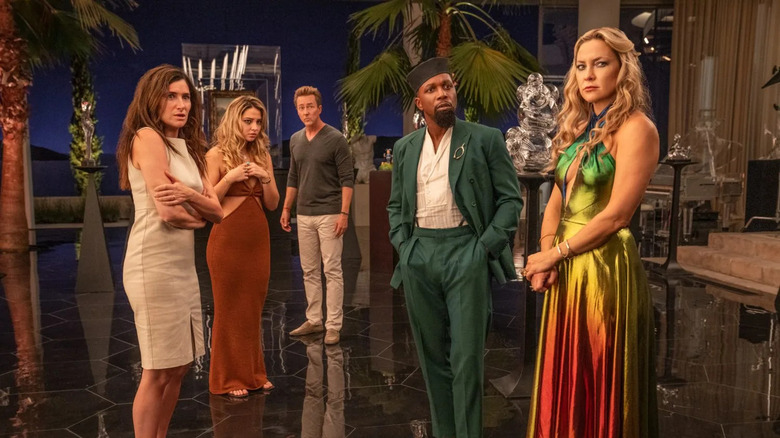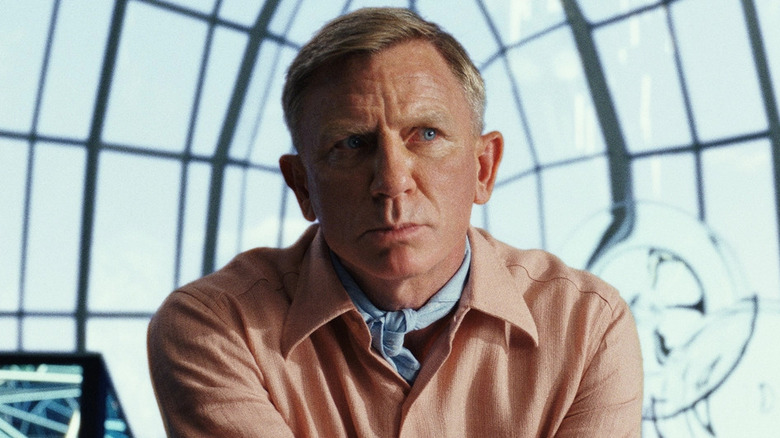Glass Onion: A Knives Out Mystery's Most Confusing Moments Explained
This article contains spoilers for "Glass Onion: A Knives Out Mystery."
"Glass Onion: A Knives Out Mystery" begins with an engrossing and highly stylized sequence in which our soon-to-be potential suspects and victims are invited to a luxurious Greek island getaway via an intricate, oversized, multi-step brain teaser. The research scientist, the governor running for a senate seat, the former fashion model-turned-athleisure designer, and the men's rights activist-slash-Twitch streamer all struggle to figure out each trick, to varying degrees (though Duke's mom breezes through the puzzle). This opening sequence is actually the perfect metaphor for "Glass Onion," which is itself an extremely metaphor-heavy movie. The title, which refers to a purposefully obtuse Beatles song, indicates that the film is more transparent than its fast-coming machinations suggest. Though it has many layers, it's easy to see through them.
And the invitation is a fitting metaphor because, to pull off its twisty, many-tendrilled plot that all comes together in the end, those plot points have to fit together like an expertly crafted puzzle. "Glass Onion" answers almost every question it poses just as satisfyingly as the first "Knives Out." Like Duke's pineapple allergy and Birdie Jay's spinning rainbow couture ensemble, everything about the murder mystery happens — and more importantly, becomes clear to the viewer — exactly how and when it needs to. But even at two hours and 19 minutes of runtime, the film throws a lot at the audience. Even if you successfully solved the case along with Benoit Blanc and Helen, these are the moments that might've left some "Glass Onion" fans scratching their heads.
Why does Miles invite everyone to his island in the first place?
Those who've seen "Glass Onion" know that Miles Bron has been the killer all along. That begs the question: Why would someone who just killed a member of his circle of friends invite the rest of that circle of friends to his private paradise for an extended getaway? The simplest reason is: so the movie could happen.
Murder mysteries have to take place in a sealed-off location. Instead of being holed up in a New England mansion, as was the case in the first "Knives Out," "Glass Onion" traps its cast of characters in Miles's gaudy modernist smart home atop his very own Greek island. Ostensibly, everyone's there to participate in the elaborate role-playing game he's hired Gillian Flynn to write. This is believable since the film establishes that this affluent group of disruptors-slash-pals gets together about once a year. Since none of the other guest knows about Andi's death, nor do they know Miles poisoned her, they have no reason to suspect anything is out of the ordinary.
Miles isn't nearly as smart as advertised (we'll elaborate later), but he's smart enough to realize that Duke saw him leaving the crime scene and that Lionel, who faxed him a copy of Andi's email, is probably suspicious, too. Depending on how quickly Miles's puzzle guy works, the murder mystery weekend could've been innocently planned long ago, or it could be Miles's way to suss out which of his friends, if any, have turned on him post-trial.
Who smashes the puzzle box?
The delightful opening sequence, in which invitations arrive at the guests' houses in the form of bespoke multilayered puzzle boxes, contains two big misdirects. Watching the characters try to solve the puzzle is so fun and distracting, the audience isn't paying attention to the details that are explicitly left out or left unsaid. First, we think Benoit Blanc (who's playing "Among Us" in the bathtub) has legitimately received an invitation because a voice yells that someone's at the door with a box. Of course, it turns out that it wasn't one of Miles' delivery people. It was Helen, there to enlist his help in solving her sister's murder. But we don't see him go to the door until the big reveal in "Glass Onion."
The more consequential misdirect is that it's Helen and not Andi who's smashing the box to smithereens, but Rian Johnson employs a clever trick here, too, to keep that information from us in this early scene. When we see Helen in a flashback meeting with Benoit to discuss the case, her naturally colored and textured hair distinguishes her from Andi's severe, straight, blonde bob. But in the scene with the puzzle box, whoever is doing the pulverizing has their hair wrapped. Theoretically, this means either sister could've solved the puzzle in the most direct way possible — with a hammer — except, later on, it's established that Helen demolished the box upon finding it, which was either commissioned before Andi's death but delivered very shortly thereafter, or sent to Andi as a sort of alibi.
What does Ethan Hawke do to the guests?
"Glass Onion" may go down in history as the movie that nails the more darkly comedic aspects of the COVID-19 pandemic. It kicks of in May of 2020, just two months after words and phrases like "masking," "social distancing," and "pods" became part of the vernacular. The characters each have their own way of dealing with restrictions and mitigation efforts. Benoit and Lionel keep six feet apart from everyone and wear their masks properly. Politician Claire just needs to look like she cares and is doing the right thing. Birdie Jay's having a blowout party with her pod, which includes Yo-Yo Ma, and wears a Lana Del Ray-like fishnet mask in public. And Duke and Whiskey forgo any measures whatsoever.
But when it's time to board the boat to Miles's island, the whole group gets on the same page and quick. Ethan Hawke has a brief but hilarious cameo as Miles's assistant. He seems shady, more like a fixer. When he arrives, he tells everyone that they won't be needing their masks anymore. With no further information, he commands them all to open their mouths, then he aims what looks sort of like a "Men in Black" neuralyzer at them. When Benoit asks what's just happened, he repeats the same phrase: "You're good."
Miles is notorious for his hastily researched inventions, so whatever treatment the guests have received could be anything from an oral vaccine to a placebo to a quack cure to something much worse. It's left to the viewer's imagination, but it's also a nifty excuse for the characters' faces to be in full view for the rest of the movie.
Why is Miles obsessed with fax machines?
One of the first things we learn about cutting-edge tech bro Miles Bron — before we even meet him — is that he has a soft spot for the decidedly outdated, low-tech fax machine. Lionel implies that while everybody else thinks he's a genius because of eccentricities like this, he's starting to have his doubts, especially when he sends faxes round the clock that say things like "AI in dogs = discourse" and "child = NFT."
During a midday conversation, Miles explains that he's installed fax machines with the same Alpha fax number all over the world. When he has one of his wild ideas, he can physically transmit it to multiple places at once. It's his preferred means of communication that helps Benoit and Helen figure out the motive for Andi's murder. When Lionel faxed Miles Andi's incriminating email, Miles got it and acted on it in the United States, but a copy also came through at his home in Greece, which remains for the sleuths to discover. It should also be noted that Miles steals ideas, so thematically, he's a facsimile of a genius.
However, there's a practical reason Miles uses faxes instead of, say, an iPhone. Rian Johnson told Vanity Fair that Apple doesn't permit villains to use iPhones in movies. If Miles had been the only person with an Android (as was the case with Chris Evans' character in "Knives Out") it'd have been possible to deduce that he was the culprit. To keep the killer's identity a mystery, all of the suspects in "Glass Onion" use non-Apple products, except for Benoit Blanc, who hopes to win an iPad.
Why does Miles let Benoit stay?
Perhaps the best decision Rian Johnson made in writing "Glass Onion" was to depict Miles Bron as stupid and overconfident. In a broad sense, the film is just as eager to poke fun at billionaires who've bought into the myth of their own genius as it is to present and solve a crime. But as it relates to the plot, Miles' inflated sense of self allows the character to behave irrationally. Most people don't commit murder in the first place, but even if they do, most would have the good sense to freak out, should the world's best detective anchor on their dock uninvited days later.
In retrospect, Miles does seem slightly shaken in that scene, but he copes fairly well. He invites Benoit Blanc up to his office where he admits to the great detective that he isn't on the guest list. Blanc, with his superior intellect, has already pre-written how the rest of the conversation will go. He pretends to be surprised, then pretends to solve the mini mystery of how this could've happened: Someone reset their puzzle box and sent it to Blanc as a lark. Miles appears to buy it at the moment and insists that Blanc should stay and play along. He partially lets his guard down at having been provided with a satisfactory answer, but the guilty billionaire probably lets this extremely threatening guest remain on the island so as not to arouse any suspicion about his involvement in Andi's death. That, and he's easily flattered by proximity to celebrity.
When does Andi die?
If "Glass Onion" is, itself, an almost perfectly constructed puzzle box of a movie, the only squeaky hinge in that box is the order of events surrounding Andi's death. The film glosses over this part of the timeline pretty quickly. Days before the trip, Andi found the real cocktail napkin and resentfully told her friends she had the evidence to prove Alpha was her idea. Duke then Lionel and Claire go to Andi's house to "check up" on her (i.e. convince her not to throw them under the bus), but only Duke on his motorcycle sees and is nearly "pancaked" by Miles' one-of-a-kind car fleeing the scene. Andi's former business partner had poisoned her and dragged her body to her car only moments before.
We know this all happened in May because of a title card at the beginning and because Miles met with Whiskey to give her a birthday present around the same time that Lionel sent the fax. When Claire and Lionel arrived at Andi's house, she was either already dead from carbon monoxide poisoning (Miles staged this to look like death by suicide, of course) or in the process of dying, as they claim she didn't answer. Helen receives word of her sister's supposed death by suicide and goes to Andi's house, where she finds the puzzle box invitation in the garage. She tells Benoit that it's only been a couple of days since Andi died, but that she didn't know she was supposed to contact the press as her surviving family member. That provides a plausible explanation for why no one's heard. The group, with Helen disguised as Andi, leave for Greece almost immediately.
If you or anyone you know is having suicidal thoughts, please call the National Suicide Prevention Lifeline by dialing 988 or by calling 1-800-273-TALK (8255).
Who is Hugh Grant supposed to be?
"Glass Onion" is layers deep in Easter eggs, several of which come in the form of cameos. Besides Yo-Yo Ma, there are Benoit Blanc's Zoom friends: Kareem Abdul-Jabbar, Natasha Leone, and the late Stephen Sondheim and Angela Lansbury. Audiences will also spot Serena Williams as well as Rian Johnson regulars Joseph Gordon Levitt and Noah Segan. But one famous face that pops up is more character development than stunt casting. When Helen knocks on Benoit Blanc's door with the busted puzzle box, none other than Hugh Grant answers in his flour-speckled apron.
He's credited as Phillip, and he's meant to be Benoit Blanc's romantic partner. In the opening sequence, he's annoyed that Blanc is spending so much time in the bathtub during quarantine. We don't know whether he's a husband, live-in lover, or visiting boyfriend, but from these few seconds of flashback, Benoit and Phillip seem pretty domesticated. We definitely get to know the detective beyond his southern drawl in the second "Knives Out" film — for example, he hates the board game "Clue" — and those personality quirks allow Daniel Craig to be significantly funnier than he was in the first film. But giving Blanc a love life that's as richly written as everything else in the "Knives Out" franchise endears us to the character even more. Since we're slowly peeling back the layers of Benoit Blanc's onion, it's reasonable to think we might see more of Hugh Grant's Phillip in the future.
Why does everyone side with Miles at the trial?
In a brief flashback, we see a younger Andi introducing a younger Miles to the rest of the crew. It's implied that Birdie, Duke, Lionel, and Claire thought Miles was annoying and un-special, and it's implied that Andi was the centrifugal force that held the group together and brought out the best in everybody. So why did every last one of her friends abandon her years later, after she gave them all their auspicious starts?
Miles — who is only ever looking out for himself — abandoned her the moment she broke with him over the pursuit of Klear, which she knew to be catastrophically dangerous. But Miles didn't just disagree with Andi. Without her approval, he couldn't move forward with the project, which necessitated the lawsuit and his (and everyone else's) lies about the napkin. Birdie Jay, Duke, Lionel, and Claire all stood with crooked Miles because, to different extents, they were more like him (scheming) than they were like her (truly innovative).
Birdie Jay was too flippant to actually look into the manufacturing of her sweatpants. Duke needs Alpha News's exposure. Lionel and Claire are already in deep with Klear, having staked their professional reputations on it. Miles, to whom everything is transactional, can essentially buy their silence, while the more altruistic Andi's friendship isn't worth enough to cajole the truth out of them. In the end, her fatal flaw was her poor judgment of character.
Why doesn't Miles destroy the napkin the first time?
Miles didn't go to Andi's place that tragic evening simply to kill her — he also needed to find the napkin that proved he'd perjured himself. He knew what to look for because Andi's email contained an attachment: a photo of her holding a red envelope.
After Miles kills Duke, who flashes a news notification of Andi's death on his phone to blackmail him into giving him a late-night TV spot, he stages a blackout (at Blanc's unwitting suggestion) and scurries off to shoot Helen. We don't know at this point whether he's aware she's really Andi's sister or if he thinks his staged death scene didn't take. But the bullet lodges in Andi's notebook, and Blanc and Helen use this opportunity (and some Jeremy Renner brand hot sauce) to fake Helen's death, so she can search one last location for the red envelope... Miles' office. Previously, she'd started a public fight with Duke so that she could storm off and ransack the other guests' rooms, to no avail.
Helen finds the envelope behind Miles' framed forgery. Moments later, as Blanc outlines his theory of the case, Helen reveals her true identity and produces the napkin with its embossed Glass Onion logo. Ever self-protective Miles snatches and burns it and Lionel asks the very question the audience is thinking: Why didn't he just destroy the evidence immediately? Again, the real answer is, so "Glass Onion" can end as dramatically as it does. But Miles is the type of person who's so convinced of his own brilliance, it wouldn't be out of character for him to keep the envelope as some sort of hubristic trophy.
Why didn't it play in more theaters?
The first "Knives Out" was an unexpected hit with critics and audiences in 2019. The relatively low-budget murder mystery made over $300 million during its Christmas season box office run. But some fans who sought out "Glass Onion" over Thanksgiving of 2023 might've been surprised to find it wasn't playing in any nearby theaters. Others who heard about it through word of mouth might have been surprised that it was completely gone from cinemas only seven days after it had premiered. Given the fact that the second film has strong reviews and awards buzz like its predecessor, and given the fact that it was playing to nearly sold-out crowds in its limited release, the marketing and release strategy for "Glass Onion" seems curious at best and like downright bad business at worst.
So why was the "Knives Out" sequel barely in cinemas after the first one was such a success? Because Netflix offered Rian Johnson more than $450 million for the rights to the franchise going forward. Though the leader in streaming has hit it big with its TV programming, it's yet to win an Academy Award for best picture or score a bona fide franchise of its own. Johnson's murder mysteries give Netflix the chance to do both. Academy rules state that films must have a qualifying release in theaters to be eligible for Oscars, and Netflix wants to play nice with the rest of the industry, including the owners of those multiplexes. But it's hoping that Benoit Blanc fans will like and subscribe or at least keep those subscriptions active if there's always another "Knives Out" mystery to solve.
